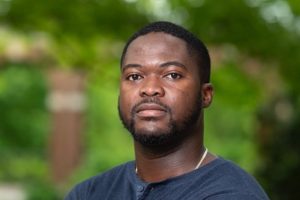
Akwasi Akwaboah, a Ph.D. candidate and Dean Robert H. Roy Fellow at the Whiting School of Engineering’s Department of Electrical and Computer Engineering, has been awarded the National Science Foundation AccelNet NeuroPAC Fellowship. This fellowship supports a collaborative exchange between Akwaboah’s home lab, the Computational Sensory Motor Systems lab led by ECE Professor Ralph Etienne-Cummings, and the University of California San Diego (UCSD) Integrated Systems Neuroengineering lab, directed by Gert Cauwenberghs.
In fall 2024, Akwaboah will conduct research at UCSD, focusing on neural interfacing technology and neuromorphic learning. The NeuroPAC fellowship, part of a National Science Foundation (NSF) initiative led by the University of Maryland and Johns Hopkins University, aims to connect neuromorphic engineers globally to advance neuromorphic intelligence, inspired by the biological brain.
Since joining Johns Hopkins in 2020, Akwaboah has been working on the development of bio-inspired artificial learning algorithms to create efficient AI systems like the human brain. At UCSD, he will focus on event-based learning to enhance recognition systems with limited data.
“I am excited about the prospects of this uncommon opportunity I have been given to advance research in AI and neural interfaces, particularly under the mentorship of two world-renowned names in neuromorphic and neural engineering. This award will certainly enable some cool ideas I have been working on for some time now,” says Akwaboah.
Etienne-Cummings adds, “Akwasi has been an exemplary student since his arrival at JHU. I am very pleased that Akwasi will join Prof. Cauwenberghs’ lab for the fall. I encourage my students to spend a semester or two at a collaborator’s lab to learn new techniques and engage in collaborative experiments, which are crucial for their professional development. Exchanges with former JHU faculty like Prof. Cauwenberghs expand our research reach. I am grateful for NSF’s support and hope JHU will continue to support these activities in the future.”